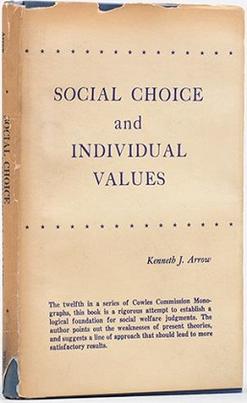
Back انتخاب اجتماعی و ارزشهای فردی Persian Social Choice and Individual Values French 사회적 선택과 개인의 가치 Korean Општествениот избор и поединечните вредности Macedonian Social Choice and Individual Values Portuguese
 | |
| Author | Kenneth Arrow |
|---|---|
| Language | English |
| Subject | Social choice theory |
| Published |
|
| Publication place | United States of America |
| ISBN | 0300179316 (3rd edition) |
Kenneth Arrow's monograph Social Choice and Individual Values (1951, 2nd ed., 1963, 3rd ed., 2012) and a theorem within it created modern social choice theory, a rigorous melding of social ethics and voting theory with an economic flavor. Somewhat formally, the "social choice" in the title refers to Arrow's representation of how social values from the set of individual orderings would be implemented under the constitution. Less formally, each social choice corresponds to the feasible set of laws passed by a "vote" (the set of orderings) under the constitution even if not every individual voted in favor of all the laws.
The work culminated in what Arrow called the "General Possibility Theorem," better known thereafter as Arrow's (impossibility) theorem. The theorem states that, absent restrictions on either individual preferences or neutrality of the constitution to feasible alternatives, there exists no social choice rule that satisfies a set of plausible requirements. The result generalizes the voting paradox, which shows that majority voting may fail to yield a stable outcome.